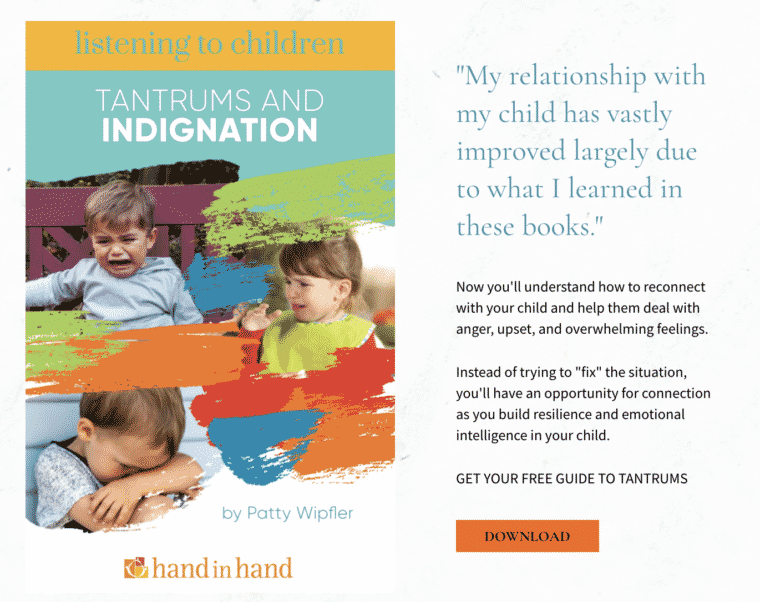Some are incredibly challenging.
And in the first few hours, days and months after your baby's birth, you may yo-yo between exhilaration and overwhelm many times.
Hand in Hand Parenting has some useful ways to help as you navigate the emotions that arise while you find your power as a parent.
Here are six nourishing ideas that all new parents should hear
These ideas nurture you as a new parent and builds a strong base of understanding as you and your baby grow together.
1. New parents need and deserve support as they navigate the huge feelings that come with a new baby.
Feelings can range from elation and deep love, to overwhelm, rage, fear and anxiety.
All of these feelings are normal, and there is nothing wrong with you, whatever feelings you are experiencing.
In our pre-baby lives, we are able to move more easily away from difficult or overwhelming feelings. Now, you may find that it is not so easy to sidestep them.
Knowing that you are not alone in these big feelings can be a huge help in counteracting anxiety, isolation and overwhelm. Hand in Hand Parenting’s Listening Partnerships tool gives parents good support.
This agreement between two parents to meet regularly to swap equal time to talk and listen attentively with no advice, no judgement and complete confidentiality, is built to counter the isolation and overwhelm that most parents face.
Listening Partnerships are the best way we know to work with whatever emotions come up for you, so that you can return to your baby restored.
You can look for a listening partner and learn more about Hand in Hand Parenting in our free group for parents. Join here.
2. Your birth story is an important moment in your life.
Whether you are Mum or Dad, the birth of your baby is a hugely important moment and one that will require lots of processing.
Science shows that it is not WHAT happens to us that dictates our experience of life, but HOW we make sense of what happens to us. The narrative we weave about our experience is incredibly important in helping us feel capable and resilient. So whether your birth experience was blissful or barbaric, talking it through with someone who will listen without interruption and without judgement is a really necessary and helpful strategy for bringing your best self to your new baby.
Carrying the weight of all those feelings into the early days of parenthood can be difficult; shedding them in the context of a warm, supportive listener, is a wonderful way to process your experience. Read more about how to uncover triggers and heal from them here.
Listening Partnerships are an ideal way to find someone who can listen well to you as you recount your experiences and feelings.
3. Your baby has emotional work to do too.
“Why are they crying?!”
There is probably no more frequent question when you bring a baby home.
And it can be confusing; especially if your baby has already been fed, rested and changed.
Here's the newsflash. Your baby has emotional work to do too. It's not easy being new in the world.
The social and emotional centre of your baby's brain is completely online and working fully from birth. This limbic system, which functions in utero, monitors for safety, making sure your baby feels secure.
Early experiences can upset this sense of safety. They can include birth trauma, medical interventions, early separation or other challenges, and your baby will need time and support to process these times. Even if your birth was labelled normal and straightforward, your baby may still have big feelings about what they’ve just gone through.
Staylistening is a beautiful way to honour this. It is a tool that allows your baby to process their feelings through yawning, crying, trembling and perspiring.
Once you have determined your baby's essential needs of feeding, nappy changes, temperature and general health have been met, you can Staylisten. Hold your baby close. Offer eye contact and a loving tone of voice. Listen carefully to their cries with warm attention.
Note that we never advise leaving a baby to cry alone. Instead, support their experience by listening attentively and with empathy.
Being listened to in this way helps a baby shed the earlier hurts and insecurities, as well as the tensions that accompany the strains and stress from the immense learning and developmental change that is taking place now that they are out in the world.
Offloading these tensions supports your baby's growth, creating the mental space and emotional resilience they need while they tackle all of those developmental milestones in the early weeks and months.
4. Special Time with your baby is a wonderful way to build your attachment bond.
Creating opportunities to give your baby regular, focused attention is a really special way to build your relationship and support their development. We call this Special Time. Simply, it's setting aside distractions for five or ten minutes, and beaming your warm love and attention on your baby.
Special Time provides a wonderful space to build connection. Try holding your baby at a time when they are usually awake and alert, and stare deeply into their eyes with love and affection.
Talk gently with them, or follow their eyes and make comments about what they gaze at.
Give yourself this permission to tune into your baby and be present with them. It's Ok, for a moment, to put away your phone, the dishes, or any of the other myriad distractions that demand our attention.
Use this tool as your baby grows into a child. It is a wonderful way to stay connected and hold the space they need to do well.
Get your free guide to Special Time.
5. Dads are important in the early days and throughout a child's life.
Dads we work with are sometimes surprised to hear how vital their role is in a family. Dads! You are incredibly important both as a support for your partner and as a primary attachment figure for the new baby. (If you are not a dad, make sure all the dads you know read this).
A baby recognises their father's voice from inside the womb.
Fathers can feel confident that their baby needs and wants them, and that the bond-building they do in the early days has a lasting impact on their relationship. This counts whether you live in the same home or not.
Dads can practice Special Time and Staylistening, and using these two tools builds deep trust and connection with a child.
Struggling with the demands of parenthood? Get support in Dad's Connect, a free group for fathers around the globe.
6. Feel empowered in your leadership.
All parents want the best for their child. And most new parents feel overwhelmed with information and advice.
Our hope for you is that you cut through the barrage of well-meaning advice and listen to your own heart and mind, making choices that you feel confident in and decisions that you are happy with.
With supportive listening, you will make the best decisions for your family. The Listening Partnerships tool is well worth experimenting with as a way to meet the demands of your new role as a parent.
Your work deserves support and celebration
Thank you for all your beautiful work as a parent to this new small person, your work deserves support and celebration. You are embarking on a pathway of many feelings and moments you may not have experienced before; support will get you through with a feeling of confidence and connection.
Wishing you lots of connection and joy with your new baby, and plenty of enjoyment in those precious early days.
Why does your child cry so loud?
What if tantrums are not just pushing your buttons?
Tantrums are often viewed as manipulative, a way for a child to make (and get) demands. This guide shows you why tantrums are not that. Instead, you'll learn what your child is really trying to tell you through a tantrum, and how you can respond with connection so that they can move on and make better choices.
Get your free guide to tantrums here.

